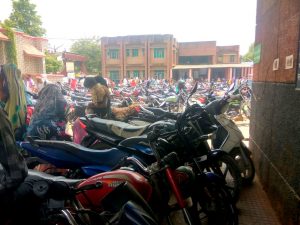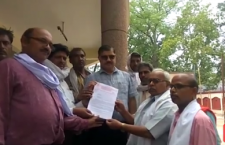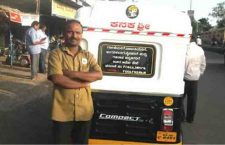With rural healthcare in shambles in Uttar Pradesh, what would you expect of the stories that permeate the immediate exteriors of the Mahoba District Hospital? Well, expect the unexpected.
“These should be parked outside the hospital, shouldn’t they?” Mohit, who is in the medicine-collection queue at the Mahoba district hospital, is visibly miffed at the motorcycles crowded right behind him. Pointing at them, he adds, “Does this look like parking space to you?”
When Mahoba reporter Shyamkali broached this very specific concern in the Khabar Lahariya newsroom, exploring it as a possible pitch, it wasn’t supremely clear why and how this could be a story. Several people had told her about it, and even though it wasn’t a regular story lead, she could smell a story in it. Sure enough, a visit to the hospital, and the extent of the problem was clear to Shyamkali: This was the district hospital after all, a one-stop health centre for rural Mahoba, where the daily footfall amounts to approximately 2000, and the already-challenged real estate was being overtaken by motorcycles. “So many critically ill, old, weak, and poor patients flock here. This hospital becomes their only hope at getting better. They can’t even sit here for a breather, it’s so cramped. Not only do they have to stand in queues, wait their turns, they now have to do all this underneath the harsh sun”, Shyamkali affirms.
Semi-ironically, the cruel summers, at its peak this month in Bundelkhand, are also the reason why the motorbikes are parked where they are, where they’re not supposed to, in the first place. Several bike owners we met told us, off-camera of course, that the district hospital is the only shaded spot in the area and so they often park their bikes there in the morning, so as not to come back to a deadly hot vehicle, too tough to mount and ride. Needless to add, the hospital employees too also end up using the interiors as parking space.
Shakti thinks it’s quite possible to find parking elsewhere, but people don’t take things such as inconvenience of the sick and deceased into consideration, “It’s quite simple. They can park it here in the village.” Mukesh Bharti at the hospital says it like it is, “This is an instance of the carelessness of the health department. There should be a strict directive against parking your cars anywhere you please. Or a proper space should be demarcated or built expressly for that purpose.” Jaswant, who is physically challenged, shares his difficulties, “Think about people like me. I’ve seen so many get hurt also, especially old people.” Panic ensues at closing time, we learn, when jostling and elbowing is the name of the game – in such a cramped space, people like Jaswant don’t stand a chance.
Uday Veer Singh, Chief Medical Superintendent at Mahoba, admits that it’s a tight situation, “The hospital was built here because there wasn’t any other land for it. Yes, it is not enough, size-wise, so we are managing the best way we can. Of course, there will be problems like lack of space to stand, lack of space to park – that is inevitable.” He qualifies his statement by washing his hands off it, checking his phone simultaneously, “When we have space, we can solve this problem. It is not upto us, it is upto higher authorities. Until then, there’s not much we can do.”
Singh does have a rather emotional and semi-poetic solution to this “obvious” problem – he weaves it into an atithi devo bhava–styled analogy, “Now, if your house is small and four families come visiting – aapke rishtedaar, maan lijiye – what will you do? You will adjust and accommodate them, isn’t it so?”
– Pooja Pande
This Khabar Lahariya article first appeared on The Wire.


